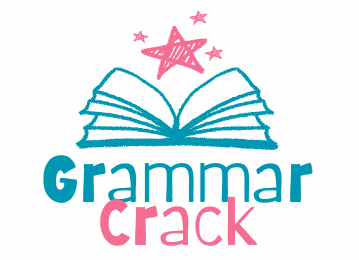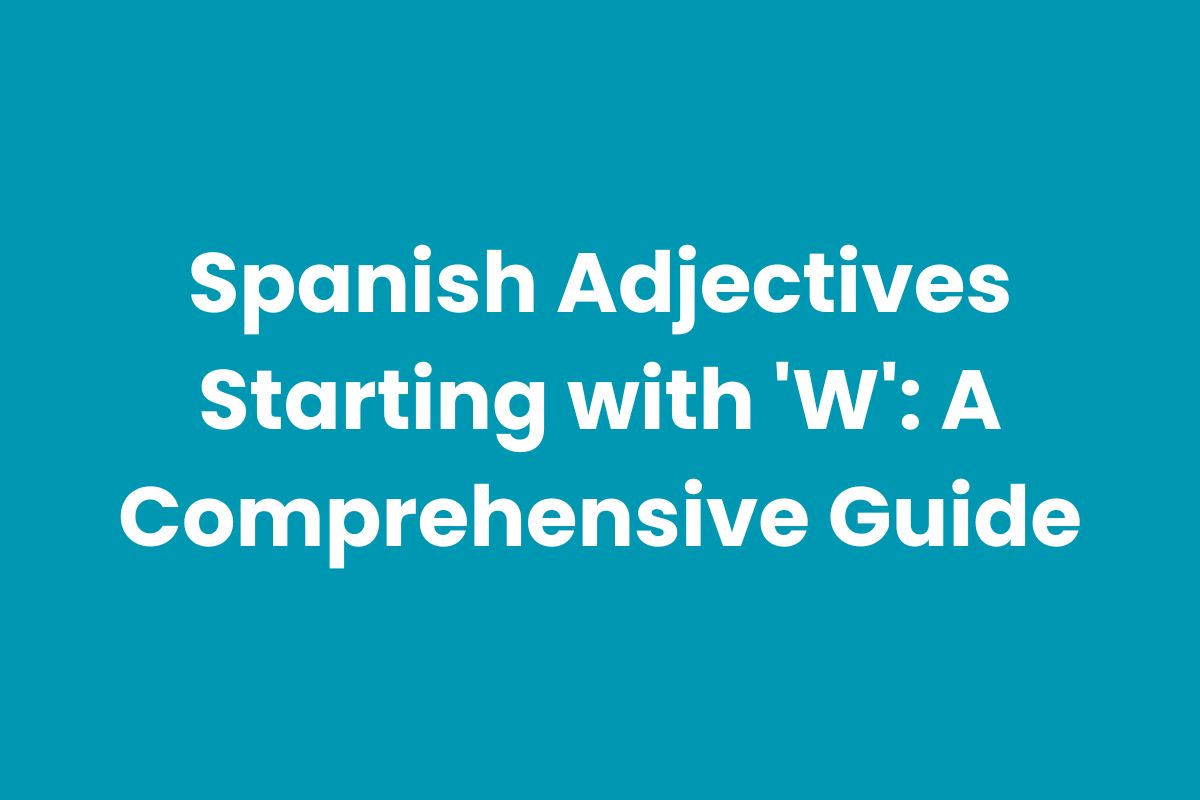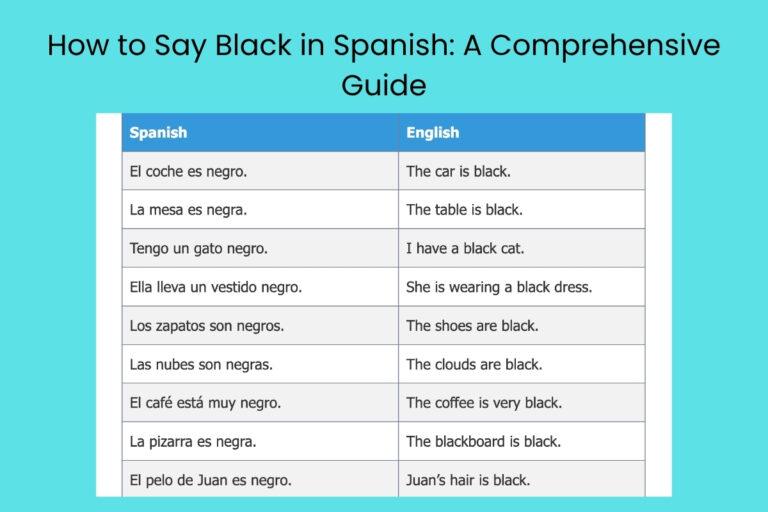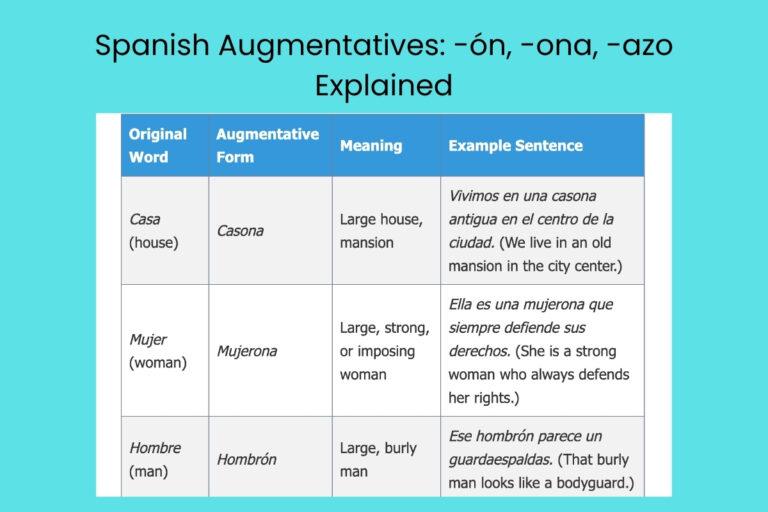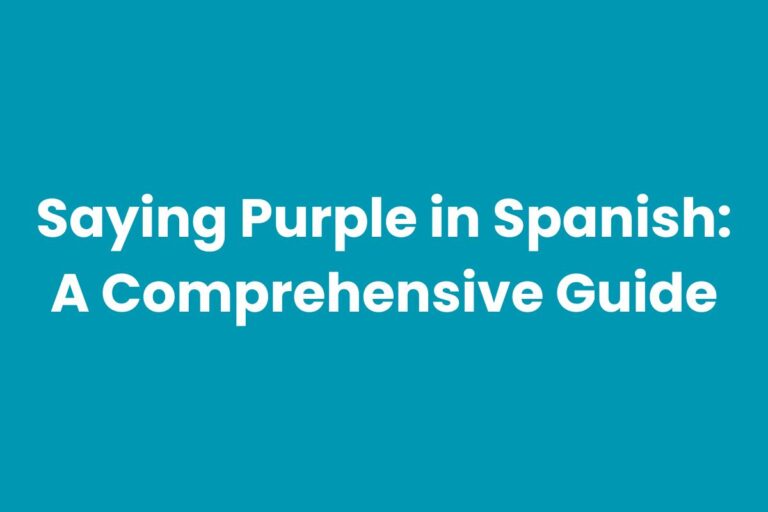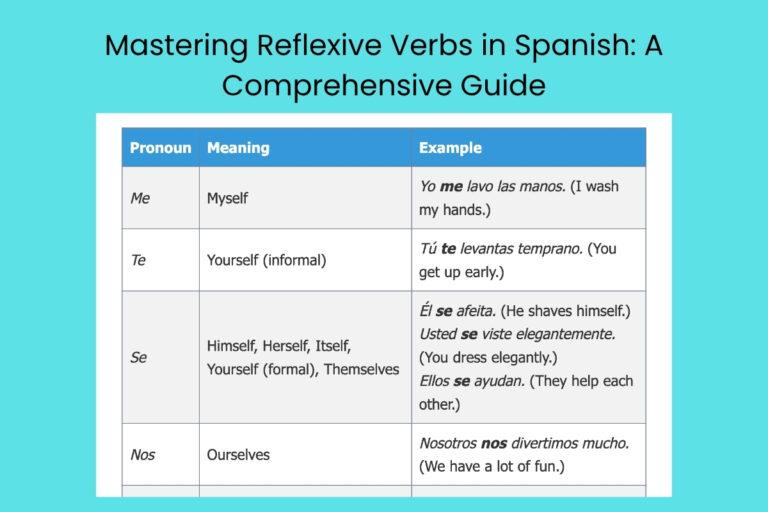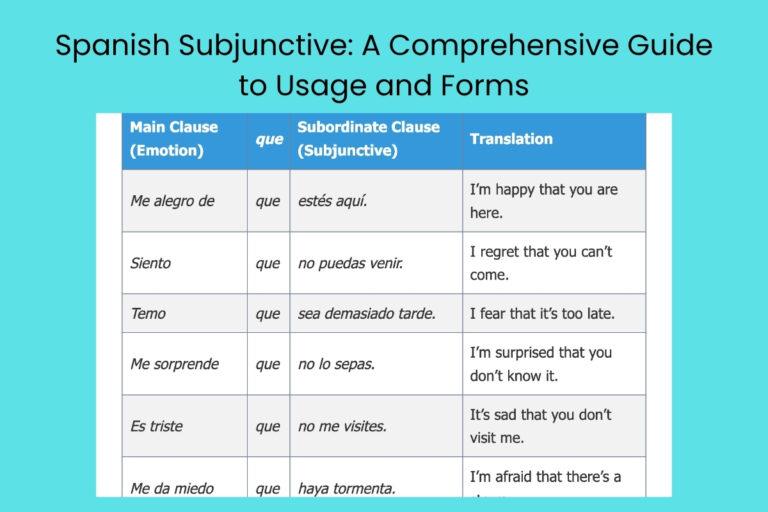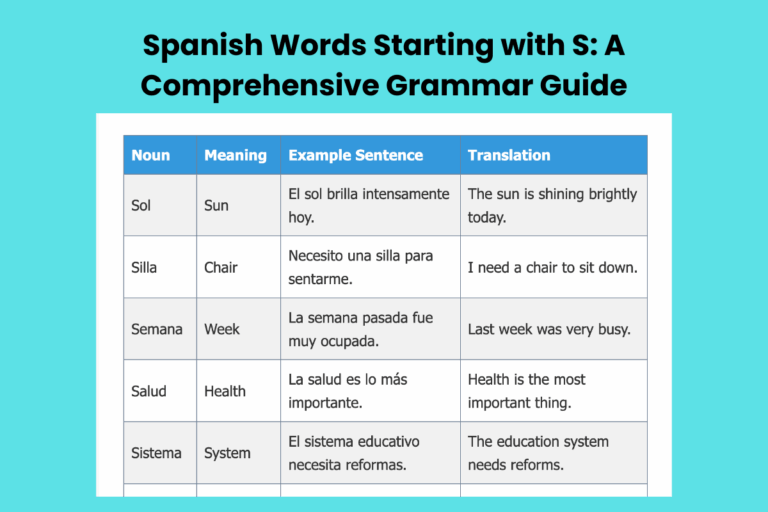Spanish Adjectives Starting with ‘W’: A Comprehensive Guide
While Spanish vocabulary is rich and diverse, adjectives beginning with the letter “w” are exceptionally rare. Understanding why and how these loanwords (words borrowed from other languages) function is crucial for advanced Spanish learners and those interested in the nuances of language adaptation.
This article delves into the limited set of Spanish adjectives that start with “w,” exploring their origins, usage, and grammatical considerations. Whether you are a student, a teacher, or simply a language enthusiast, this guide will provide you with a thorough understanding of this unique linguistic phenomenon.
Table of Contents
- Introduction
- Definition: Spanish Adjectives Starting with ‘W’
- Structural Breakdown
- Types and Categories
- Examples of Spanish Adjectives Starting with ‘W’
- Usage Rules
- Common Mistakes
- Practice Exercises
- Advanced Topics
- Frequently Asked Questions (FAQ)
- Conclusion
Introduction
The Spanish language, celebrated for its expressiveness and grammatical complexity, typically borrows words from other languages, adapting them to its phonetic and grammatical structures. However, due to historical and linguistic reasons, adjectives starting with the letter “w” are extremely scarce.
Most of these words are relatively recent loanwords, primarily from English or German. Understanding how these loanwords function within the Spanish grammar system is essential, especially for achieving advanced fluency and appreciating the dynamic nature of language evolution.
This article provides a detailed exploration of these unique adjectives, their usage, and the grammatical rules governing them.
Definition: Spanish Adjectives Starting with ‘W’
Spanish adjectives starting with “w” are loanwords, which means they have been adopted from other languages, primarily English or German. These adjectives describe qualities or characteristics of nouns, just like any other adjective, but their foreign origin often influences their pronunciation and usage.
Due to the limited number of these adjectives, they are often encountered in specific contexts, such as technical or specialized vocabulary. Their incorporation into Spanish reflects the ongoing interaction between languages and the way Spanish adapts to new concepts and technologies.
Classification
Adjectives starting with “w” in Spanish can be classified based on their origin. Most are derived from English (e.g., western) or German (e.g., Wagneriano, though typically used as a noun). Understanding their etymology helps in grasping their meaning and usage in Spanish. These adjectives, though few in number, are increasingly relevant in modern Spanish due to globalization and technological advancements.
Function
The function of these adjectives is the same as any other adjective in Spanish: to modify or describe a noun. They provide additional information about the noun’s qualities, characteristics, or attributes. For example, “western” might describe a type of movie (una película western) or a cultural influence (influencia western). The key is that they must agree in gender and number with the noun they modify, following standard Spanish grammatical rules.
Contexts
Adjectives starting with “w” are most commonly found in specific contexts, such as discussing international relations, technology, or cultural phenomena. For instance, you might encounter “western” when talking about movies, music, or geopolitical strategies. The rarity of these adjectives means they are not typically used in everyday conversation but rather in more specialized or formal settings. Their presence often indicates the influence of foreign cultures or technologies on Spanish-speaking societies.
Structural Breakdown
The structural breakdown of Spanish adjectives starting with “w” is relatively straightforward. They follow the basic rules of Spanish adjective agreement, meaning they must agree in gender (masculine or feminine) and number (singular or plural) with the noun they modify. However, given their foreign origin, some may not always fully conform to typical Spanish adjective endings. For example, “western” might remain unchanged regardless of the noun it modifies, particularly in informal contexts.
The typical structure of a phrase containing these adjectives is: Article + Noun + Adjective (or Article + Adjective + Noun, depending on emphasis and style). The adjective’s ending (if it changes) will reflect the gender and number of the noun. For instance, “el estilo western” (the western style, masculine singular) or “las películas western” (the western movies, feminine plural). Note that in some cases, especially with direct loanwords, the adjective might not change its form.
The influence of English can also be observed in the usage of these adjectives. Sometimes, the adjective is used in a way that mirrors English sentence structure, which might not always be grammatically perfect in Spanish but is often understood in context.
This highlights the dynamic process of language borrowing and adaptation, where strict grammatical rules may be relaxed to accommodate new words and expressions.
Types and Categories
Although the number of Spanish adjectives starting with “w” is limited, they can be categorized based on their origin and usage. The primary categories are English loanwords and German loanwords, each with distinct characteristics and contexts.
English Loanwords
English loanwords are the most common type of Spanish adjectives starting with “w.” These adjectives are often related to technology, culture, or international relations. Examples include “western” (used to describe movies, culture, or geopolitical strategies), “web” (referring to the internet), and other specialized terms. These adjectives may or may not be adapted to Spanish grammatical rules, depending on the context and the speaker’s level of formality.
German Loanwords
German loanwords are less common but still present in Spanish. These adjectives often relate to classical music, philosophy, or specific cultural movements. An example is “Wagneriano,” derived from the composer Richard Wagner. While technically an adjective, it is more frequently used as a noun to describe someone who admires Wagner’s work. These words tend to be more formal and less frequently used in everyday conversation compared to English loanwords.
Adjectives from Other Origins
While rare, there might be adjectives from other languages that have been adapted into Spanish and start with “w.” These would be highly specialized and context-dependent. The key characteristic is that they are not native to Spanish but have been incorporated through linguistic borrowing.
Their usage would still follow the general rules of Spanish adjective agreement, but their pronunciation and spelling might retain elements of their original language.
Examples of Spanish Adjectives Starting with ‘W’
Understanding how these adjectives are used in context is crucial for mastering their usage. The following tables provide extensive examples of Spanish adjectives starting with “w,” categorized by their origin and usage.
Table 1: Examples of “Western” in Spanish
This table illustrates the various ways the adjective “western” can be used in Spanish, showcasing its flexibility and common contexts.
| Spanish Sentence | English Translation |
|---|---|
| La película es de género western. | The movie is of the western genre. |
| Tiene una fuerte influencia western. | It has a strong western influence. |
| El estilo de vida western es muy diferente. | The western lifestyle is very different. |
| La música country es música western. | Country music is western music. |
| Los vaqueros son un símbolo western. | Cowboys are a western symbol. |
| La moda western está de vuelta. | Western fashion is back. |
| El mundo western es fascinante. | The western world is fascinating. |
| La cultura western es rica en historia. | Western culture is rich in history. |
| El cine western es muy popular. | Western cinema is very popular. |
| La frontera western era peligrosa. | The western frontier was dangerous. |
| El arte western es muy expresivo. | Western art is very expressive. |
| La leyenda western sigue viva. | The western legend lives on. |
| El paisaje western es impresionante. | The western landscape is impressive. |
| La historia western es compleja. | Western history is complex. |
| El baile western es muy divertido. | Western dance is very fun. |
| Prefiero las películas del viejo western. | I prefer old western films. |
| Adoptó un acento western después de vivir allí. | He adopted a western accent after living there. |
| La filosofía western ha influido en el mundo. | Western philosophy has influenced the world. |
| La medicina western es avanzada. | Western medicine is advanced. |
| El pensamiento western es individualista. | Western thought is individualistic. |
| La tecnología western está en todas partes. | Western technology is everywhere. |
| El desarrollo western ha transformado las ciudades. | Western development has transformed cities. |
| La educación western es valorada. | Western education is valued. |
| La política western es dinámica. | Western politics is dynamic. |
Table 2: Examples of “Web” in Spanish
This table focuses on the use of “web” in Spanish, primarily in the context of the internet and technology.
| Spanish Sentence | English Translation |
|---|---|
| El diseño web es crucial. | Web design is crucial. |
| La página web es muy útil. | The web page is very useful. |
| El contenido web debe ser atractivo. | Web content should be engaging. |
| El desarrollo web es un campo en crecimiento. | Web development is a growing field. |
| La aplicación web es fácil de usar. | The web application is easy to use. |
| La tecnología web está en constante evolución. | Web technology is constantly evolving. |
| La plataforma web es intuitiva. | The web platform is intuitive. |
| El sitio web es muy visitado. | The web site is very visited. |
| La analítica web es importante. | Web analytics are important. |
| El marketing web es esencial. | Web marketing is essential. |
| El tráfico web ha aumentado. | Web traffic has increased. |
| La seguridad web es crucial. | Web security is crucial. |
| El hosting web es necesario. | Web hosting is necessary. |
| El diseño web responsive es vital. | Responsive web design is vital. |
| El contenido web debe ser accesible. | Web content should be accessible. |
| El dominio web es fácil de recordar. | The web domain is easy to remember. |
| La presencia web es fundamental. | Web presence is fundamental. |
| El servicio web es confiable. | The web service is reliable. |
| La interfaz web es amigable. | The web interface is friendly. |
| El portal web ofrece mucha información. | The web portal offers a lot of information. |
| La herramienta web es muy potente. | The web tool is very powerful. |
| El desarrollo web frontend es desafiante. | Frontend web development is challenging. |
| El desarrollo web backend es complejo. | Backend web development is complex. |
| La accesibilidad web es importante para todos. | Web accessibility is important for everyone. |
Table 3: Examples of “Wagneriano/a” in Spanish
This table showcases the usage of “Wagneriano/a” in Spanish, typically referring to aspects related to the composer Richard Wagner.
| Spanish Sentence | English Translation |
|---|---|
| Es un admirador wagneriano. | He is a Wagnerian admirer. |
| La música wagneriana es impresionante. | Wagnerian music is impressive. |
| El estilo wagneriano es único. | The Wagnerian style is unique. |
| La ópera wagneriana es muy larga. | Wagnerian opera is very long. |
| La influencia wagneriana es notable. | The Wagnerian influence is notable. |
| El drama wagneriano es intenso. | Wagnerian drama is intense. |
| La interpretación wagneriana fue excelente. | The Wagnerian interpretation was excellent. |
| El concepto wagneriano de Gesamtkunstwerk es innovador. | The Wagnerian concept of Gesamtkunstwerk is innovative. |
| La escuela wagneriana sigue sus principios. | The Wagnerian school follows his principles. |
| El legado wagneriano es perdurable. | The Wagnerian legacy is enduring. |
| La sociedad wagneriana organiza eventos. | The Wagnerian society organizes events. |
| El festival wagneriano es anual. | The Wagnerian festival is annual. |
| La estética wagneriana es grandiosa. | The Wagnerian aesthetic is grandiose. |
| El simbolismo wagneriano es profundo. | The Wagnerian symbolism is profound. |
| La orquestación wagneriana es rica. | The Wagnerian orchestration is rich. |
| Sus ideas son claramente wagnerianas. | His ideas are clearly Wagnerian. |
| El teatro tiene un diseño wagneriano. | The theater has a Wagnerian design. |
| La producción fue muy wagneriana. | The production was very Wagnerian. |
| La narrativa es de estilo wagneriano. | The narrative is in a Wagnerian style. |
| El enfoque wagneriano es revolucionario. | The Wagnerian approach is revolutionary. |
Usage Rules
The usage rules for Spanish adjectives starting with “w” are similar to those for other adjectives, with some nuances due to their foreign origin. The primary rule is that they must agree in gender and number with the noun they modify.
However, there are exceptions, especially with direct loanwords that might not change their form.
Agreement in Gender and Number
Most Spanish adjectives must agree in gender (masculine or feminine) and number (singular or plural) with the noun they modify. For example, if “western” were to fully adapt to Spanish rules, it would change to “westerno” (masculine singular), “westerna” (feminine singular), “westernos” (masculine plural), and “westernas” (feminine plural). However, in practice, “western” often remains unchanged, especially in informal contexts.
Position of Adjectives
In Spanish, adjectives usually follow the noun they modify. However, the position can change depending on the emphasis or style. Placing the adjective before the noun can add emphasis or a subjective quality. For example, “una película western” (a western movie) is the standard order, but “una western película” is also possible for emphasis.
Exceptions and Special Cases
The main exception is that many loanwords, including those starting with “w,” may not always follow the standard agreement rules. They might remain in their original form, especially in informal contexts or when the speaker is more familiar with the original language. For example, you might hear “la página web” without changing “web” to agree with “página.”
Common Mistakes
Several common mistakes can occur when using Spanish adjectives starting with “w,” primarily related to agreement and pronunciation. Recognizing these errors and understanding the correct usage is essential for improving fluency and accuracy.
Mistake 1: Incorrect Agreement
Incorrect: “El película western.”
Correct: “La película western.” (The article must agree with the feminine noun “película.”)
Explanation: Spanish nouns have gender, and the articles (el, la, los, las) must match the noun’s gender. “Película” is feminine, so it requires “la.”
Mistake 2: Not Adapting Loanwords
Informal/Acceptable: “Las películas western.”
More Formal/Correct: While there isn’t a fully adapted version widely used, if adapting, it would theoretically be “Las películas westernas.” (This is not common.)
Explanation: In very formal contexts, adapting the loanword to follow Spanish adjective endings might be considered more correct, but it’s not always necessary or common, especially with “western” and “web.”
Mistake 3: Mispronunciation
Incorrect Pronunciation: Pronouncing “western” with a strong English “w” sound.
Correct Pronunciation: Adapting the pronunciation to sound more like “güestern” in some regions, softening the “w” sound.
Explanation: Spanish does not have a “w” sound identical to English. The pronunciation is often modified to fit Spanish phonetic patterns.
Practice Exercises
Test your understanding of Spanish adjectives starting with “w” with these practice exercises. Fill in the blanks with the correct adjective form or choose the correct sentence.
Exercise 1: Fill in the Blanks
Complete the following sentences with the appropriate form of “western” or “web.”
| Question | Answer |
|---|---|
| 1. Me gusta mucho la música ____. | western |
| 2. El diseño ____ es fundamental para el sitio. | web |
| 3. Es una película del género ____. | western |
| 4. La página ____ es muy informativa. | web |
| 5. Tiene una fuerte influencia ____. | western |
| 6. El desarrollo ____ está en auge. | web |
| 7. La cultura ____ es fascinante. | western |
| 8. El contenido ____ debe ser atractivo. | web |
| 9. Prefiero el estilo ____. | western |
| 10. La aplicación ____ es fácil de usar. | web |
Exercise 2: Choose the Correct Sentence
Select the grammatically correct sentence from the options provided.
| Question | Options | Answer |
|---|---|---|
| 1. Which sentence is correct? | A) El película western. B) La película western. | B) La película western. |
| 2. Which sentence is correct? | A) La página web es útil. B) El página web es útil. | A) La página web es útil. |
| 3. Which sentence is correct? | A) Los estilos western son populares. B) El estilo western son populares. | A) Los estilos western son populares. |
| 4. Which sentence is correct? | A) El diseño web es importante. B) La diseño web es importante. | A) El diseño web es importante. |
| 5. Which sentence is correct? | A) Las influencias western es notable. B) La influencia western es notable. | B) La influencia western es notable. |
| 6. Which sentence is correct? | A) El sitio web es visitada. B) El sitio web es visitado. | B) El sitio web es visitado. |
| 7. Which sentence is correct? | A) La música western es bonita. B) El música western es bonita. | A) La música western es bonita. |
| 8. Which sentence is correct? | A) La tecnología web es avanzada. B) El tecnología web es avanzada. | A) La tecnología web es avanzada. |
| 9. Which sentence is correct? | A) Las películas western son interesantes. B) El películas western son interesantes. | A) Las películas western son interesantes. |
| 10. Which sentence is correct? | A) El contenido web es importante. B) La contenido web es importante. | A) El contenido web es importante. |
Advanced Topics
For advanced learners, understanding the nuances of loanword adaptation and the sociolinguistic factors influencing their usage can provide a deeper appreciation of the Spanish language. This includes studying the historical context of language borrowing, the attitudes of native speakers towards loanwords, and the role of institutions in regulating language usage.
One advanced topic is the concept of linguistic purism, which is the belief that a language should be protected from foreign influences. In some Spanish-speaking countries, there may be resistance to using loanwords, preferring native Spanish alternatives. Understanding this perspective can help learners navigate different cultural contexts and use language appropriately.
Another advanced area is the study of code-switching, which is the practice of alternating between two or more languages or dialects in conversation. This is common in bilingual communities and can involve using loanwords from one language while speaking another. Analyzing code-switching patterns can provide insights into language contact and the social dynamics of bilingualism.
Frequently Asked Questions (FAQ)
Here are some frequently asked questions about Spanish adjectives starting with “w,” along with detailed answers to clarify common points of confusion.
- Q: Why are there so few Spanish adjectives starting with “w”?
A: The letter “w” is not native to Spanish and is primarily found in loanwords from languages like English and German. Historically, Spanish has favored using native vocabulary or adapting foreign words to its phonetic and grammatical structures. This results in a limited number of adjectives that retain the “w” at the beginning.
- Q: Do Spanish adjectives starting with “w” always need to agree in gender and number?
A: Ideally, yes. However, in practice, many loanwords, including those starting with “w,” are often used without changing their form, especially in informal contexts. While grammatically adapting them is more correct, the unchanged form is widely understood and accepted in many situations.
- Q: How should I pronounce Spanish words starting with “w”?
A: The pronunciation of “w” in Spanish loanwords can vary. Often, it is softened to sound more like a “gü” sound, similar to how “w” is pronounced in German. However, the pronunciation may also depend on the speaker’s region and familiarity with the original language of the loanword.
- Q: Is it better to use Spanish alternatives instead of loanwords starting with “w”?
A: It depends on the context and your audience. In formal settings or when communicating with someone who prefers linguistic purism, using Spanish alternatives is advisable. However, in many modern contexts, loanwords are widely accepted and understood, so using them is often fine.
- Q: Are there any new Spanish adjectives starting with “w” being added to the language?
A: As technology and globalization continue to influence language, new loanwords, including those starting with “w,” may be adopted into Spanish. However, their acceptance and usage will depend on various factors, including their usefulness and how well they integrate into Spanish phonetic and grammatical structures.
- Q: Where can I find more examples of Spanish adjectives starting with “w”?
A: You can find more examples in specialized dictionaries, technical manuals, and online resources related to technology, culture, and international relations. Pay attention to how these words are used in context to better understand their meaning and usage.
- Q: How can I improve my understanding of loanwords in Spanish?
A: To improve your understanding of loanwords, study their etymology, pay attention to how they are used in different contexts, and practice using them in your own writing and speaking. Also, be aware of the attitudes of native speakers towards loanwords and adjust your usage accordingly.
- Q: Is “Wagneriano” the only common adjective from German starting with ‘W’?
A: While “Wagneriano” is one of the better-known examples, the scarcity of adjectives starting with ‘W’ in Spanish means that other examples are highly specialized or less frequently encountered. It remains one of the more prominent adjectives of German origin beginning with this letter.
- Q: How do I know when to adapt a loanword fully into Spanish?
A: There’s no hard-and-fast rule. Generally, the more integrated a word is into everyday usage, the more likely it is to be adapted. However, with adjectives starting with ‘W,’ it’s often acceptable to leave them in their original form, especially if a fully adapted version sounds awkward or isn’t widely recognized.
- Q: Are there regional differences in the use of these adjectives?
A: Yes, there can be regional variations. Some regions might be more open to using loanwords in their original form, while others might prefer or even create adapted versions. Additionally, pronunciation can vary significantly from one Spanish-speaking country to another.
Conclusion
Understanding Spanish adjectives starting with “w” provides valuable insights into the dynamic nature of language and the influence of foreign cultures. While these adjectives are few in number, their usage reflects the ongoing interaction between languages and the way Spanish adapts to new concepts and technologies.
By mastering the rules of agreement, pronunciation, and context-specific usage, learners can enhance their fluency and appreciation of the Spanish language.
The key takeaways from this article include recognizing the foreign origin of these adjectives, understanding their function in modifying nouns, and being aware of the exceptions to standard agreement rules. Remember to practice using these adjectives in context and to be mindful of the attitudes of native speakers towards loanwords.
With continued practice and attention to detail, you can confidently and accurately use Spanish adjectives starting with “w” in your communication.
